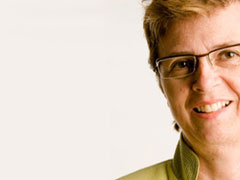The Penny Drops
By Laura Pratt
It was a day to throw open the doors on the mysteries of medical science, and to enlighten representatives from a body that helps to make them happen.
A phalanx of Ontario division Canadian Cancer Society (CCS) principals, fresh from a morning leadership meeting at the Sunnybrook Estates, assembled at Sunnybrook Health Sciences Centre in early March. They were there, says CCS Ontario division CEO Peter Goodhand, “to show senior staff that the money does get spent on real things and real people.”
A series of dynamic presentations by some of the leading researchers at Sunnybrook Research Institute (SRI) and the Odette Cancer Centre (OCC) confirmed it.
Dr. Michael Julius, vice-president of research at Sunnybrook, held the audience rapt with his impassioned explanation of the hospital’s dedication to translating its discoveries into the clinical arena. The cancer research program, which represents 54% of all research at SRI, is “one of the brightest of our research stars,” he said.
Up next was Dr. Linda Rabeneck, a senior scientist at SRI, regional vice-president of Cancer Care Ontario and vice-president of the OCC. In the fact-laced plain speak that is characteristic of Rabeneck’s oratory, she delivered a compelling presentation on colorectal cancer that made her audience squirm with appreciation for the research she’s overseeing here.
Colorectal cancer, the number-one cause of non-tobacco-related cancer deaths in this country, is alarming in part for the lack of attention it gets on the world stage. The OCC is shining a light on this oversight with health services research into the maldistribution of access to tests like colonoscopies and the concept of—in the future—testing people in the target group (aged 50 years and over) for mutated DNA that suggests a proclivity for developing this cancer.
Afterwards, the 23 CCS senior staffers, who hail from such backgrounds as fundraising, operations, advocacy, cancer control and community development, got a view of the nuts and bolts of science with a visit to some SRI labs. Dr. Arun Seth, a senior scientist in molecular and cellular biology, invited participants to view prostate cancer cells under a microscope in the tissue culture room. Dr. Robert Nam, an associate scientist in clinical epidemiology, presented on prostate cancer research and his work to cultivate a better method than the now gold standard prostate-specific antigen test for predicting a man’s likelihood for developing this disease. Dr. Kullervo Hynynen, director of imaging research and senior scientist at SRI, expounded on the application of high-intensity focused ultrasound for treating tumours, a cutting-edge technology he pioneered.
All told, the CCS has dedicated $6.6 million to finance research at Sunnybrook over the last five years. But research funding is only part of the contribution, says Goodhand. The other part is a message about healthy living and volunteerism. Volunteers in Ontario drove cancer patients 14 million kilometres to treatment last year, from as far as 200 km away. “It’s a partnership,” says Goodhand. “It’s all about having our people work with yours.”
The tour was, by all accounts, a stirring and informative success. “It was to educate and inspire us,” says Goodhand. “And it did. Often with science you just can’t understand. But all the presenters today made it real.”
PDF / View full media release »





